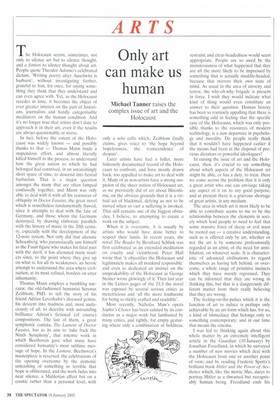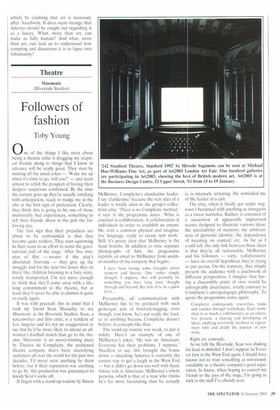ARTS
Only art can make us human
Michael Tanner raises the complex issue of art and the Holocaust
The Holocaust seems, sometimes, not only to silence art but to silence thought, and a fortiori to silence thought about art. People quote Theodor Adorno's celebrated dictum, 'Writing poetry after Auschwitz is barbaric', without investigating further, grateful to him, for once, for saying something they think that they understand and can even agree with. Yet, as the Holocaust recedes in time, it becomes the object of ever greater interest on the part of historians, journalists and hardly categorisable meditators on the human condition. And it's no longer true that artists don't dare to approach it in their art, even if the results are always questionable or worse.
In fact, before the extent of the Holocaust was widely known — and possibly thanks to that — Thomas Mann made a stupendous effort, and almost literally killed himself in the process, to understand how the great nation to which he had belonged had contrived, in an astonishingly short space of time, to descend into bestial barbarism. That is a major question amongst the many that are often lumped confusedly together, and Mann was only able to deal with it with all his resources of obliquity in Doctor Faustus, the great novel which is nonetheless fundamentally flawed, since it attempts to deal with the fate of Germany, and those whom the Germans destroyed, by drawing elaborate parallels with the history of music in the 20th century, especially with the development of the 12-note system. Not only did that alienate Schoenberg, who paranoiacally saw himself as the Faust figure who makes his fatal pact with the devil; it has alienated many readers since, to the point where they give up on what is, for all its weaknesses, an heroic attempt to understand the area where civilisation, at its most refined, borders on utter inhumanity.
Thomas Mann employs a bumbling narrator, the old-fashioned humanist Serenus Zeitblom, PhD, to tell the story of his friend Adrian Leverkuhn's diseased genius. his descent into madness and, most audaciously of all, to describe with astounding brilliance Adrian's fictional (of course) compositions. The last of them, a great symphonic cantata, The Lament of Doctor Faustus, has as its aim to 'take back the Ninth Symphony', that totemic work in which Beethoven gave what many have considered humanity's most sublime message of hope. In the Lament. Beethoven's masterpiece is reversed, the celebrations of the opening overcome by the demonic unleashing of something so terrible that hope is obliterated, and the work fades into near silence, a Mahlerian effect but on a cosmic rather than a personal level, with only a solo cello which, Zeitblom finally claims, gives voice to 'the hope beyond hopelessness, the transcendence of despair'.
Later artists have had a fuller, more hideously documented record of the Holocaust to confront, and have mostly drawn back, too appalled to make art to deal with it. Many of us non-artists have a strong suspicion of the sheer notion of Holocaust art, as we previously did of art about Hiroshima, on the obvious grounds that it is a virtual act of blackmail, defying us not to be moved when so vast a suffering is invoked. That still remains one of the biggest obstacles, I believe, to attempting to create a work on the subject.
When it is overcome, it is usually by artists who would have done better to respect their limits. In recent years, the novel The Reader by Bernhard Sch link was first celebrated as an extended meditation on cruelty and victimhood; Peter Hall wrote that 'it objectifies the Holocaust and legitimately makes all mankind responsible' and even so dedicated an insister on the unspeakability of the Holocaust as George Steiner wrote glowingly of it. Then last year in the Letters pages of the TLS the novel was exposed by several serious critics as meretricious and 'all the more loathsome for being so slickly crafted and readable'.
Most recently, Nicholas Maw's opera Sophie's Choice has been saluted by its conductor as a major work but lambasted by many critics, and rightly, for empty gesturing where only a combination of boldness, restraint and clear-headedness would seem appropriate. People are so awed by the monstrousness of what happened that they are all the more likely to be impressed by something that is actually muddle-headed, because that mirrors their own state of mind. As usual in the area of atrocity and terror, the why-oh-why brigade is present in force. I wish they would indicate what kind of thing would even constitute an answer to their question. Human history has been so routinely appalling that there is something odd in feeling that the specific case of the Holocaust, which was only possible thanks to the resources of modern technology, is a new departure in psychology and morality. Do people really think that it wouldn't have happened earlier if the means had been at the disposal of previous dictators or powerful ideologues?
In raising the issue of art and the Holocaust, then, it's crucial to say something about which aspects of the Holocaust art might be able, or has a duty, to treat. Here we come across the problem that it is only a great artist who one can envisage taking any aspect of it on to any good purpose, and at present there is a grievous shortage of great artists, in any medium.
The area in which art is most likely to be able to contribute seems to me to be the relationship between the elements in society which lead people to need to feel that some massive force of decay or evil must be rooted out — a creative understanding, such as is offered only by art, whether or not the art is by someone professionally regarded as an artist, of the need for annihilation, on whatever scale. It is characteristic of advanced civilisations to regard themselves as having left behind, or overcome, a whole range of primitive instincts which they have merely repressed. They can be informed that they are wrong in thinking this, but that is a dangerously different matter from their really believing that they are wrong.
The feeling-on-the-pulses which it is the function of art to induce is perhaps only achievable by an art-form which has, for us, a kind of immediacy that belongs only to something contemporary; and in our time that means the cinema.
I was led to thinking again about this whole matter by an extremely intelligent article in the Guardian (10 January) by Jonathan Freedland, in which he surveyed a number of new movies which deal with the Holocaust from one or another point of view; and by reading Frederic Spotts's brilliant book Hitler and the Power of Aesthetics which, like the movie Max, dares to portray Hitler as a thwarted but recognisably human being. Freedland ends his
article by claiming that art is necessary after Auschwitz. It does seem strange that Adorn° should he caught out regarding it as a luxury. What, more than art, can make us fully human? And what, more than art, can lead us to understand how tempting and disastrous it is to lapse into inhumanity?



























































 Previous page
Previous page